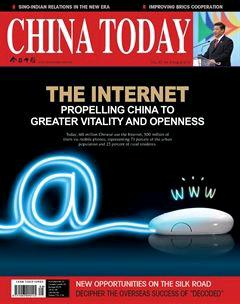East–West Culture through the Eyes of a German Scholar
DOES a universe of differences separate the two hemispheres that make up Eastern and Western cultures? Or, even in our multicultural world, has the phenomenon always been that of either the West wind dominating in the East, or the East wind dominating in the West? Is equilibrium between the two great cultural systems of China and the West possible?
German scholar Thorsten Pattberg has been comparing the cultures of China and the West in his online blogs since 2009. His in-depth philosophical, aesthetic, and sociological analyses include cultural comparative studies – from Zhuang Zi to Jackie Chan, from the Confucian concept “Heaven and men are a unit; they form the one” (“天人之际,合而为一”) to the modern Olympics slogan“One World, One Dream,” and from Plato to Nicolaus Copernicus. The authors vivid language and apt examples that pinpoint similarities and differences between Eastern and Western cultures touch as well on contemporary social topics. In the process of writing, Pattberg has also communicated online with his readers, so further piquing their interest. Around 150,000 people in the U.S. have read and downloaded his articles, which have now been compiled and published in the book, The East-West Dichotomy: The Conceptual Contrast between Eastern and Western Cultures.
Thorsten Pattberg is a German philosopher and scholar, and former research fellow at the Institute for Advanced Humanistic Studies, Peking University. Born in 1977 in Hamm, Germany, Pattberg worked as clerk at the district court house, and later obtained his masters degree in Asian Studies from the University of Edinburgh. Pattberg was a foreign researcher at the Historiographical Institute of the University of Tokyo, and a research fellow in the Sanskrit Department of Harvard University. In China, he studied under the guidance of Ji Xianlin, Gu Zhengkun, and Tu Weiming, whom he considers his spiritual masters.
Pattberg raises in this book the concept of the “East-West dichotomy” – an ancient philosophical notion wherein Eastern and Western cultures are diametrically opposed –one from the particular to the universal, the other from the universal to the particular; the East is more inductive and the West is more deductive. Together they form an equilibrium.
Pattbergs underlying dichotomy is that because Westerners tend to be rugged individualists they are analytic and deductive in their thinking. Easterners, meanwhile, tend to focus on the collective, and so have a more intuitive, inductive, holistic approach to life. The author also reveals how this dichotomy has shaped the different Western and Oriental attitudes towards nature and philosophy (both epistemology and ethics), as well as gender and society.endprint
When talking about the future of cultural development in the East and the West, Pattberg raises the questions:“How do the East and the West engage in a mutually beneficial relationship? And if they do, what form should that relationship take? ……Are there any dangers?” In his view, forcibly mixing the two cultures is dangerous, but cultural domination by either East or West is evidently not an option. Perhaps the first thing is for them to confront together their cultural differences and understand their origins, connotations and influences. These efforts to narrow the gap might enable the two civilizations to understand each other and achieve cultural coexistence.
The East-West Dichotomy represents the authors acute observations and views over several years of Eastern and Western civilization. A number of distinguished scholars, among them main representative of contemporary New Confucianism Tu Weiming, Professor of Ethics and Philosophy of Politics at Tsinghua University Daniel A. Bell, president of the International Comparative Association of Chinese and West Cultures Gu Zhengkun, and celebrated British psychologist Iain McGilchrist, have given positive reviews of Pattbergs works.
India is another representative of Eastern culture. Rajiv Malhotra, well-known IndianAmerican scholar and founder of The Infinity Foundation, has been studying the development and heritage of Indian culture under the background of todays globalization. Malhotra holds that The East-West Dichotomy is an important contribution to the East-West debate – one both critical and urgent in view of the present, ongoing radical shifts. The West has dominated the discourse on the history and philosophy of civilizations for the past few centuries, but Asias earlier domination is now making a return to the world stage. Malhotra believes that Pattbergs contribution merits a say in this conversation.
Pattbergs book makes a refreshing and lively contribution to current research on cultural differences between the East and the West.
Pattberg is working on his next book in which he elucidates translations of Chinese concepts and words, such as shengren(圣人), ren(仁), and tianxia(天下), which are often misunderstood in Western culture. In his view, it is not possible to apply Western concepts or terms to Chinese vocabulary. For example, the English translation of shengren is sage or philosopher. But the two words have different meanings. Such translations hence distort the implied meanings of the original Chinese words. Pattberg consequently hopes to explain certain essential Chinese concepts and acquaint Western readers with the nucleus of Chinese civilization, so helping them to understand Chinas common values.endprint

